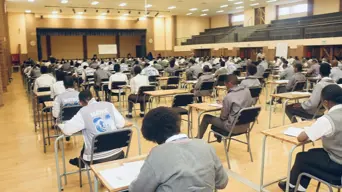Why court is questioning urgency of application to stop public release of 2024 matric results
The Information Regulator is facing down the Department of Basic Education in court over the publication of the 2024 National Senior Certificate results.

Grade 12 pupils writing their final exams. Picture: @Siviwe_G/X
As matric students await the customary publication of their exam results in South African newspapers, the Information Regulator is facing down the Department of Basic Education (DBE) in court.
The regulator's brought an urgent application to interdict the publication of the 2024 National Senior Certificate results.
It's applying for an interdict to prevent the DBE from publishing results using methods it does not consider compliant with the Protection of Personal Information Act (Popia), which includes newspapers.
A ruling on urgency is expected on Wednesday morning in the Gauteng division of the High Court, as the scheduled release date of 13 January draws closer.
In a nutshell, says Eyewitness News reporter Zoleka Qodashe, the contestation of the issue of urgency comes down to the fact that a division of the same court heard an application in 2022 on essentially the same basis on the publication of matric results.
In its ruling in the 2022 application, the court compelled the DBE to publish the results - now a tradition that has continued.
"The question has arisen, particularly from the judge, of why the Information Regulator waited so long before taking action - there are a number of things that have occurred but there isn't necessarily a track record of what the regulator has done, before approaching the court on an urgent basis."
"The 2022 order has not been challenged, no appeal has been launched against it even by the regulator itself. That means the order is binding and valid until it is set aside."
Zoleka Qodashe, Reporter - Eyewitness News
This means that if the judge on Wednesday dismisses the application and finds that there is no urgency, the public release of the 2024 matric results will go ahead.
To hear more detail of the legal intricacies involved, listen to the interview audio at the top of the article